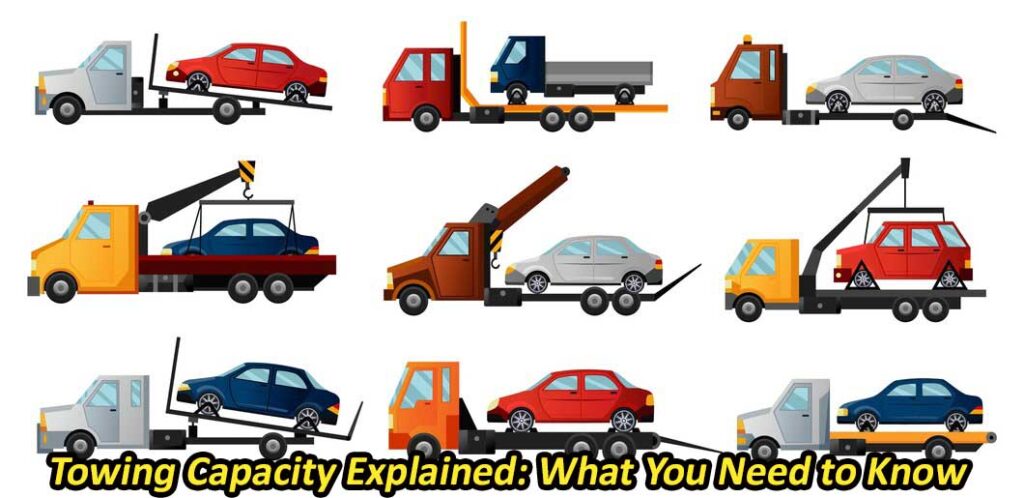Towing might look easy on preliminary observation, but the towing has to be done within the vehicle’s rated towing capacity to avoid causality. Whether you are packing up your camper for a long drive across the country or you use your car to take a boat to the lake, understanding towing capacity is essential. This guide is written to explain what towing capacity is, why it exists, and how you can find the towing capacity of your car. After this article, you will have all the information required to tow effectively while avoiding any related dangers.
Towing Capacity Explained: What You Need to Know

What is Towing Capacity?
Towing capacity is the weight that any given vehicle can tow to a particular destination. This is the total mass of the trailer and any load it may carry at any one time. This can make the car unpredictable or unusable, leading to skidding or stalling, brake failure, or significant transmission problems.
Knowing what towing capacity means is essential because it means knowing what vehicle you need for your towing project and avoiding damaging your car beyond repair.
Why Towing Capacity Matters
Understanding your tow capacity is not just a statistic but life-saving. Towing beyond your car’s capability is dangerous to you, those in your vehicle, and other road users. It can also affect the life of your car as it will cause constant tear and wear.
When you stick to towing capacity, you ensure that your vehicle stays within the design limitations of both cars and is stable on the road.
Gross Vehicle Weight Rating (GVWR)
The GVWR is also an essential term in terms of towing capacity. In this case, the vehicle’s towing capacity is determined by subtracting the GVWR from the Gross vehicle weight rating. This refers to the maximum weight your vehicle can safely carry, including the car itself, its occupants, freight and the tongue weight that comes with the trailer.
Your vehicle’s GVWR can be easily found on the label inside the driver’s door or in the owner’s manual. This figure helps you know how much more weight your vehicle can tow.
Gross Trailer Weight (GTW)
GTW means the gross weight of the trailer together with the load that is to be transported. As with GVWR, it is important for safe towing. Driving a trailer with too much load affects its stability through swaying, reduces the braking power, and adds stress to the trailer.
The GTW is usually determined by weighing the loaded trailer at a public weigh station, then applying the formula: The last thing you would want is to be stranded on the road or to experience a horrific accident because your GTW exceeded your vehicle’s towing capacity.
Types of Tow Truck and When To Use Them
How to Calculate Towing Capacity
It is quite easy to identify your vehicle’s towing capacity, depending on the following calculation: Find the difference between your car’s curb weight and its GVWR. This gives you the total weight that you can tow to the optimum level of safety.
For instance, if your car still has a GVWR of 7000 pounds and its curb weight is 5000 pounds, you’ll have a towing capacity of 2000 pounds for your vehicle.
Curb Weight and Its Definition
Luggage volume refers to the amount of space available in your car to store your commodities when you’re travelling. It comprises the mass of obligatory fluids, such as oil and fuel.
Your curb weight determines your vehicle’s maximum towing capacity, so it is important to ensure you do not overtax your car.
Tongue Weight and Load Distribution
Tongue weight can, therefore, be defined as the force that acts downwards from the trailer tongue on the hitch. Its value should be within the range of 10-15% of the overall trailer’s weight.
The ideal tongue weight is central to managing truck loads. If it is too much, the vehicle will tend to sag, and if it is too little, the trailer will sway.
Payload vs. Towing Capacity
People often need clarification on payload and towing capacity, which are different. Payload means the load you can transport with your vehicle plus passengers, goods, and the weight of the trailer tongue.
Whereas towing capacity concerns the amount of weight that your car is capable of pulling, payload, on the other hand, concerns how much weight your car can take.
Understanding Towing Terms
It is unwise to be in the dark regarding towing terminology like GVWR, GTW, and tongue weight, among others, to tow familiarly.
These terms are standard when defining a certain kind of vehicle, especially in trailers, and knowledge of their differences is helpful.
Towing Equipment and Accessories
Knowing your towing capacity is crucial, as is having the right towing equipment. Such components include a hitch, ball mount, safety chains, and brake controller.
Every piece of equipment should correspond to the towing capacity of your car to prevent failures while towing.
How to Ensure Safe Towing
Precautions are essential when towing. First and foremost, make sure your car’s brakes, tyres, and suspension are in optimal condition.
It is safe to employ appropriate towing practices, such as gradually accelerating, travelling at low speed, and using longer mirrors.
Conclusion
Hauling capacity is information pertinent to any driver who intends to tow a trailer. This way, you do not cause an accident and can extend the life expectancy of your car, truck, or SUV. Always take time to estimate your towing capacity; it is equally important to make sure your towing equipment is of this capacity and to follow safe towing practices.
This way, you forget about worrying during the towing process and can solely concentrate on what is happening in front of the car. If you’re ready to dive into towing capability, perhaps it is time to seek assistance from specialised people.
